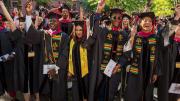Like the rest of the world, Harvard was ready to move past the pandemic this spring—but, Janus-like, kept peering back, too. The University planned a full-dress 371st Commencement extravaganza for the class of 2022 on May 26, and a similar “Commencement celebration” three days later for the alumni of 2020 and 2021. Their degrees had already been conferred, but this was a Crimson coming-together to confirm that fact, and create emotional closure for everyone who wished to partake. In the event, plenty did.
But the virus doesn’t go down easy. On May 23, Harvard University Health Services executive director Giang T. Nguyen, omnipresent in email inboxes these many months, popped up again. COVID-19 transmission in Boston and Cambridge was “high,” he wrote. (Omicron subvariant BA.2.12.1 was the dominant U.S. strain at midweek, and the state’s average test positivity rate hovered around 9 percent, as more than 800 Massachusetts patients were then hospitalized with the infection.) He instructed Commencement participants to test daily, stay away if they tested positive or exhibited symptoms, and resume masking indoors and in crowded situations. The Wednesday dinner for honorands, the governing boards, and distinguished guests began with a reception outside, under a tent, rather than the crowded Memorial Hall central court, before proceeding to Annenberg. Among the dignitaries absent May 29 were the law and (ironically) public health deans, both of whom had positive tests and so handed off the degree-confirming duties to colleagues.
But these adaptations should be seen as just that: signs of coping with a pandemic that had derailed Commencements two years running. As if to show who is boss, the University staged a surprise tribute to those who served during the ordeal as the centerpiece of the May 29 make-up celebration; by rights, it should help Harvardians put the worst of COVID-19—the fears, losses, and lesser deprivations—safely in the rear-view mirror.

Trisha S. Pasricha ’11, M.P.H. ’22, supporting and supported by Laurie Ramudu, A.B. 2043; the 2022 Kirkland House cohort waves the flag;Lowell House’s Mason T. Forbes ’22, recipient of the “first degree”

No mistaking the ’22 Divinity School grads Mary T. Perez, M.Div., Maya C. James, M.T.S., and Jessica M. Chang, M.Div.; ’20 mid-career M.P.A.s Rochelle Lindsay and Ashley Whitlock, ready to master the globe
Photographs by Jim Harrison
Cutting to the chase, this most unusual Commencement—two separate celebrations, three classes, nearly 9,000 students graduating on Thursday and an even larger cohort of recent graduates convening on Sunday, 60,000-plus people in all—went off brilliantly. The Thursday exercises, in their new, condensed format, were accompanied by a nearly flawless spring day, with temperatures rising from the low 50s to the low 70s. And the unique Sunday celebration was, if anything, even better: a pellucid, blue day, with temperatures in the upper 70s as happy graduates and their families and friends flowed from Tercentenary Theatre to House and school events, where degrees were recognized, long post facto, photo op by photo op. As U.S. Attorney General Merrick Garland ’74, J.D., ’77, the guest speaker, aptly summarized matters for the Sunday throng, “I know it must be a bit strange to be back here: not as soon-to-be graduates anxious about the future, but as actual graduates—anxious about the future. It does relieve the pressure on me…speaking at your 10-year reunion instead of your graduation. Yes, 2020 through 2021 was a long decade for all of us.”
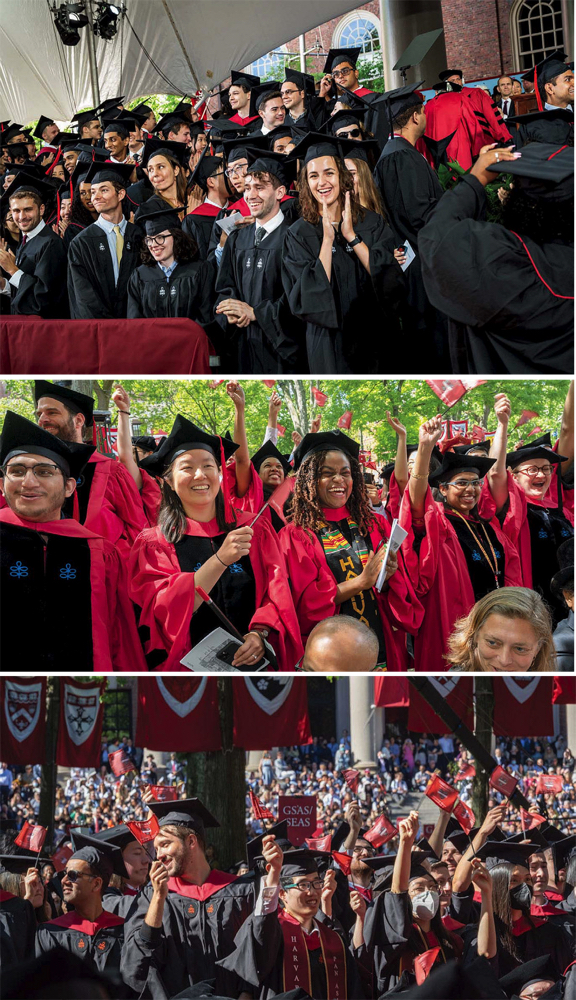
The 2020-2021 College summas and class marshals draw near; Ph.D. ’22 recipients, in the gowns certifying their arrival in “the ancient and universal company of scholars”; Harvard Business School ’20-’21 graduates
Photographs by Jim Harrison
Given the enormous work involved in pulling off two Commencements back-to-back (and the tragic circumstances that necessitated doing so), one hesitates to say that practice makes perfect. But in 2022, it really did.
The events of the week were appropriately both celebratory and solemn. At the Phi Beta Kappa exercises in Sanders Theatre Tuesday morning, May 24, Thomas professor of government and sociology Theda Skocpol, the orator, became the first of many speakers to sound the alarm about the perilous state of democracy, warning, “Cynical grifters and rancid political provocateurs (some of them, sad to say, graduates of this and other elite colleges) abuse their platforms to stoke hatred and inspire violent attacks.” But as a social scientist who has traveled the country to listen to people of very different persuasions, she also counseled the soon-to-be graduates to “get out of your professional bubbles, hear what others have to say in their own words…including people who harbor views you cannot share”—a message that would also echo through the coming days.
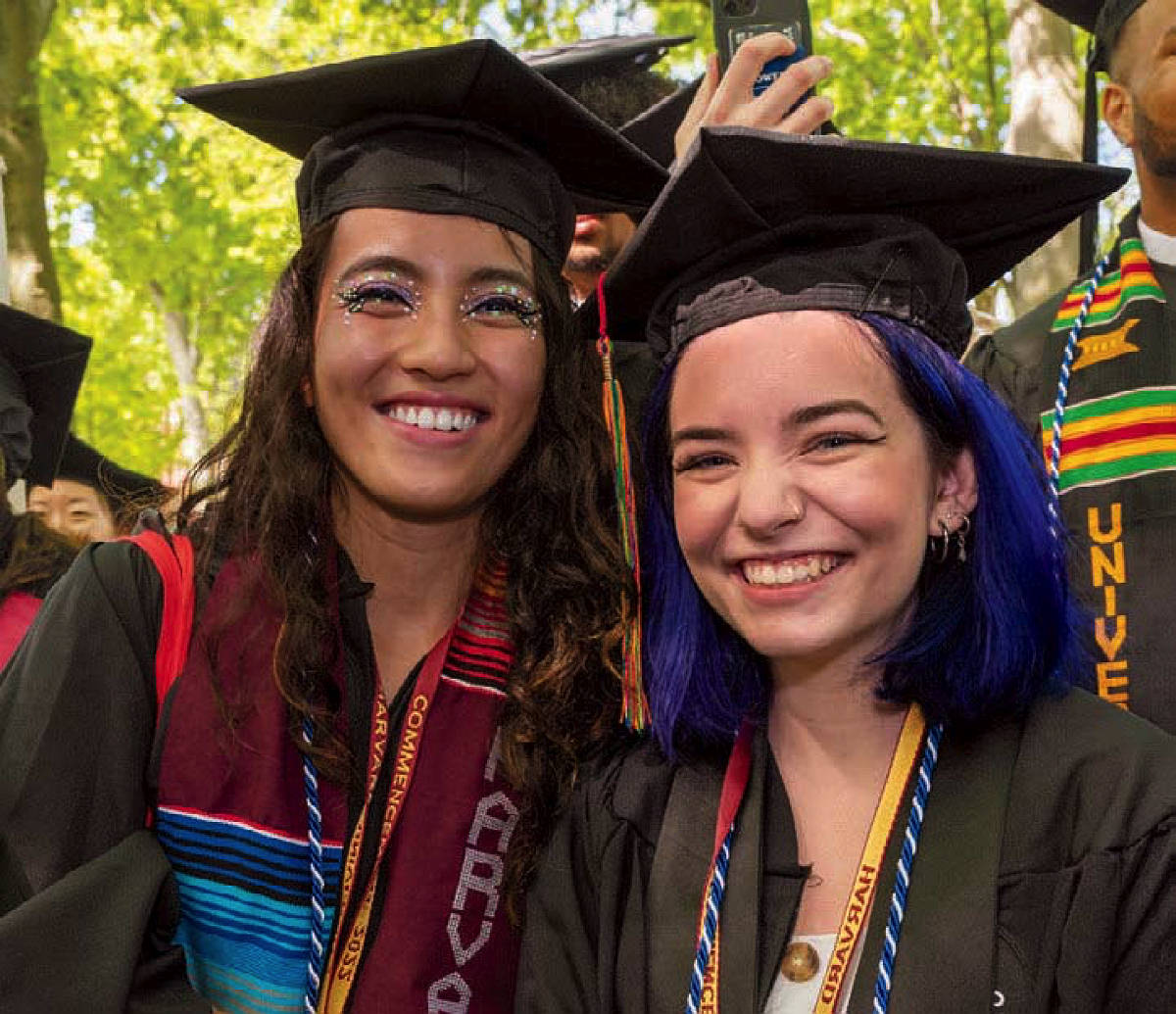
Samantha S. Carrillo and Kendra N. Wilkinson of Lowell House ’22, feeling anything but blue
Photograph by Jim Harrison
The Baccalaureate ceremony, that afternoon, was held in Tercentenary Theatre rather than in Memorial Church, a new wrinkle. Given the undergraduates’ increasing diversity, the decision has been made to move on from the formal, Christian setting to a more open one henceforth. Speaking to the students and guests, who could listen in-person for the first time, President Lawrence S. Bacow reflected on his own serendipitous career choices and—encouraging the students (in their parents’ presence) to take chances—recalled that when he struggled to make a decision, his mother had always said, “‘Larry, what’s the worst that can happen? Can you live with that? If so, why worry? Go for it.’ I hope you are as liberated by this advice as I’ve been throughout my life.”
Turning to larger concerns, against the backdrop of a brutal war in Europe, the nation’s highest-ranking military officer, Chairman of the Joint Chiefs of Staff General Mark A. Milley, said at the ROTC commissioning ceremony on Wednesday, “It’s our job, your job, my job, the job of all of us in uniform, to maintain a very high level of readiness—to maintain the strength of our military in order to prevent a great power war.” (Putting their oaths in the fraught domestic political context, he told the new officers, “You will never, ever turn your back on the U.S. Constitution.”) The Harvard Kennedy School Class Day speaker embodied geopolitical reality even more vividly: Maia Sandu, M.C./M.P.A. ’10, president of Moldova, the small and existentially threatened former Soviet Socialist Republic—at risk of invasion should Vladimir Putin’s ambitions metastasize—said, “There can be no justification for Russia’s war against Ukraine, another sovereign nation, for capturing territories or carving out spheres of influence in the twenty-first century.”
Speaking on the second anniversary of George Floyd’s death, Law School Class Day guest Loretta Lynch ’81, J.D. ’84, former U.S. Attorney General, remembered that “shocking crime, a senseless tragedy.…And for those of us who have worked on police reform over the years it stood as a literal rebuke to all of our efforts.” She spoke of such deaths as “a choice…not to deal with the original sin: the systemic racism woven into the fabric of our society.” (That theme resonated, too, as Radcliffe Medalist Sherrilyn Ifill, president and director-counsel emerita of the NAACP Legal Defense and Education Fund, said on Friday, “It’s impossible to talk about the unraveling of our democracy,” and how to save it, “without talking about the embrace of white supremacy in this country.”)
And in a time of fierce polarization and disrupted discourse, Conant University Professor Danielle S. Allen, a political theorist, provided the Graduate School of Design Class Day audience with a diagnosis of what had gone wrong: “Why is it exactly that things are so crazy, so complicated, so messy in this country right now?” Her short answer: “Facebook broke democracy. They didn’t mean to, it was definitely an accident, but they definitely did.” Again, that focus on social media would carry through the speeches to come.
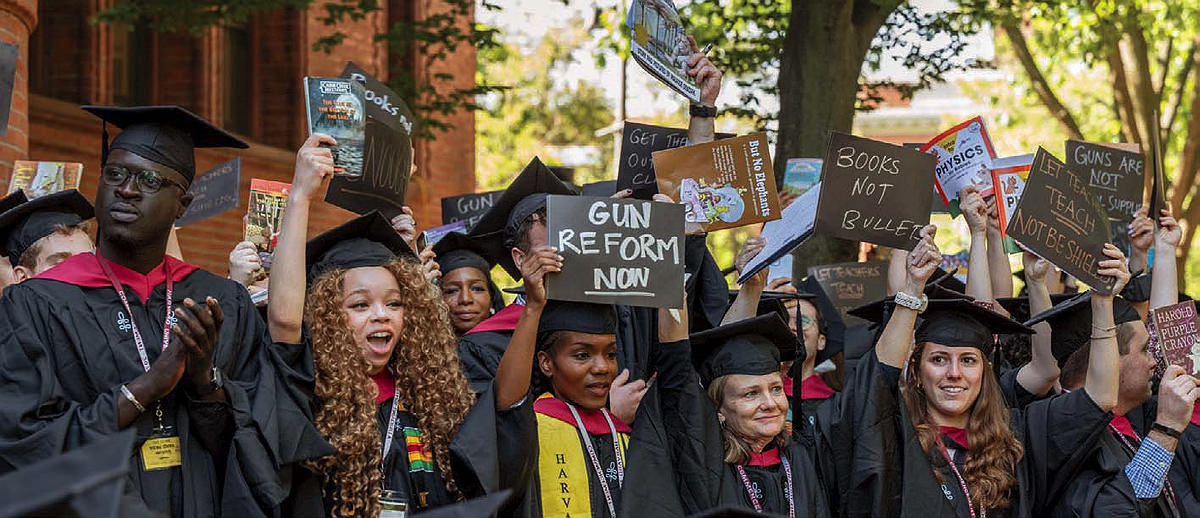
After the Uvalde, Texas, school shooting, the May 29 Graduate School of Education cohort had a political message to go with their usual prop: children’s books.
Photograph by Jim Harrison
As of this 371st, the old Commencement rituals have a new look. The erstwhile “morning exercises” now are graduation: focused on the students’ degrees, honorands, and a guest speaker’s address. The “afternoon exercises”—focused on alumni, and reunions—are now a rescheduled Harvard Alumni Day, with another guest speaker, which debuted June 3 this year.
After the usual processing and calling to order, President Bacow came forward to ask, “on this day of joy and celebration” for graduates and families, for a moment of silence during “a time of tragedy—a time of pain beyond words” for those under bombardment in Ukraine, and the loved ones of those murdered in horrific mass shootings in this country. (He did the same on May 29.)
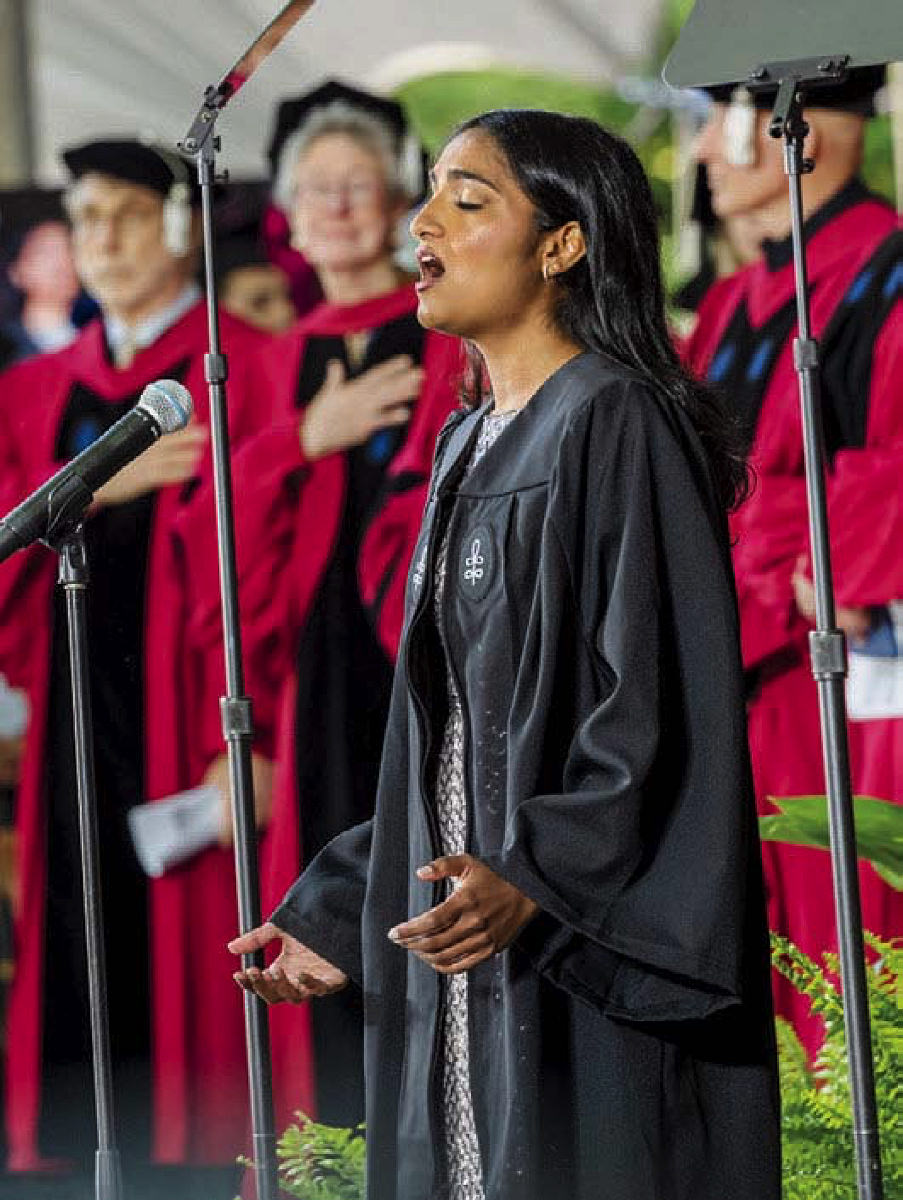
Soloist Nivi Ravi ’21 stirred the celebratory May 29 crowd with her “Star-Spangled Banner.”
Photograph by Jim Harrison
A stirring saxophone solo version of “The Star-Spangled Banner,” by Veronica Leahy ’23 (the first of many outstanding student performers and composers), and the opening prayer—including an indigenous-land acknowledgment to the Massachusett tribe—preceded Bacow’s welcoming remarks, and a call to humility (see “Save a Seat for Others”).
In an age when science and technology hog the spotlight, Latin Salutatorian Benjamin Porteous ’22 did his best to reclaim space for the humanities. It is unknown what the classics faculty feeds students, but his animated, expressive exposition rocked (as did his outfit—see page 18; and his Sunday successor, Caroline Engelmayer ’20, was no pipsqueak, either). His talk was a tribute to a member of the staff, Harvard University Dining Services’ John S. Martin, who swiped students’ IDs when they entered Annenberg for a meal—and recalled details about the families and interests of seemingly every one of them. Porteous hailed Martin, in the crowd, who gratefully acknowledged his friend—a proxy for his hundreds of student friends.
The degree conferral proceeded with a minimum of spirited disruptions, as if the students were so stunned at their good fortune—graduating, in person—that they did not know they were allowed to act young at heart. Among the honorands, Jean-Jacques Muyembe-Tamfum, an indefatigable infectious-disease hunter from the Democratic Republic of the Congo, kept his mask on. Feminist Gloria Steinem won a big, spontaneous cheer, as did José Andrés, founder of World Central Kitchen (understandably absent, as he focused on feeding the dispossessed in Ukraine). See the complete roster and citations on the opposite page.
Honorand and speaker Jacinda Ardern, the young and energetic prime minister of New Zealand, immediately connected, telling the audience, “There are some moments in life that make the world feel small and connected,” but “This is not one of them.” She continued, “I am used to walking into a room in New Zealand and knowing at least someone. It is one of the beautiful and comforting aspects of living in a small country. And while this moment feels incredibly daunting to me right now, I do take comfort knowing there are approximately 30 New Zealanders studying here, and statistically at least one of them will be my cousin.” (She found a way to create that sense of closeness again that afternoon, meeting with New Zealand students and faculty members at Loeb House, leaving the attendees aglow. For his part, Merrick Garland said Sunday that he had met the day before with Harvard and other area law students to thank them for pro bono representation of families facing eviction during the pandemic.)
Drawing on that sense of community, and her own experiences leading her country through COVID-19 and a terrorist assault on Muslims, Ardern amplified Allen’s critique of social media, and underscored Skocpol’s message about building community and listening to others, to overcome current threats to democracy; see page 20.
After “Fair Harvard” (the “Harvard Hymn” is now sung at Baccalaureate) and a benediction, the bells, silent the past two springs, pealed their welcome sound again, two and a half hours of glorious ceremony concluded to the beat of the University Band, and diploma ceremonies ensued across the campus.
The Sunday celebration for the classes of 2020 and 2021 followed a similar script, but with a different emotional register. They combined to produce a more relaxed, wholly successful result—far from given, under the weird circumstances that led to this day.
Although the crowd was, if anything, larger (more graduates from the two classes registered than the number of degree recipients on May 26), the event was somewhat less formal. The faculty delegation on the Commencement platform was smaller. Rather than addressing “Mr. President and Fellows of Harvard College, Madam President and Members of the Board of Overseers,” as at Commencement, deans preparing to present the recent graduates addressed “Mr. President, members of the Governing Boards.” Bacow in turn spoke to “confirm the conferral on you” of the appropriate degree, awarded and mailed 12 or 24 months earlier.
There was even ad-libbing. Medical School dean George Q. Daley made a shout-out to his graduated/soon-to-be confirmed son Jack Daley ’21. During the Business School segment, Bacow saluted Nitin Nohria, who had served the classes as dean before stepping down. Confirming public-health degrees, Bacow added to the formal language, which concludes, “[Y]ou are well prepared to generate and utilize knowledge to improve health throughout the world” the heartfelt coda, “and God knows the world needs it.”
Provost Alan M. Garber led a brisk, truncated recap of the accomplishments of the 2020 honorand/guest speaker, and of the 2021 honorands present, with Bacow reprising their citations from last spring’s online presentation.
And then Garber introduced a surprise moment, not in the program: “In these extraordinary times, and in view of the extraordinary experiences of the classes of 2020 and 2021, we now pause to give thanks.” As a slide show of community members played, representatives of the classes came to the microphone to thank them for sustaining Harvard and keeping its people safe during the pandemic, ending each cohort recognized (those who enabled online teaching and learning, healthcare providers, vaccine researchers and public-health experts, and so on) with the refrain, “We salute you, and we thank you.” The last two segments veered in a different direction:
We rise to thank all the families of all the members of the Harvard classes of 2020 and 2021. Without you—shout-out to my mom—we would not be here. And without your extraordinary support over these past two years and more, we would not be able to share in this moment. We love you, and thank you so much.
The last to speak was Bacow, who said:
It is my turn to thank all the members of the historic Harvard classes of 2020 and 2021….Your Harvard experience was disrupted by a deadly and daunting pandemic. You had to navigate challenges unlike any faced by your predecessors….And you did so with resilience and resolve, with creativity and compassion, with grit and grace. We salute you, we thank you—and we congratulate you all.
It seemed that this community—often divided between administrators and professors, faculty and students, the tenured mandarins and the many staff members who make the place work—having been really sundered by the pandemic, had somehow through that experience been brought together as never before.
Merrick Garland, gentle of voice, spoke in unmistakably firm tones about the risk to democracy in threats of violence, or actual violence, and implored the graduates to devote their energies to public service (see page 21).
Following his final admonition to the graduates to put their educations to good use “after a raucous—but of course legal—celebration,” it was time for “Fair Harvard” again, and the second benediction in four days by Matthew I. Potts, Pusey Minister in the Memorial Church and Plummer professor of Christian morals: a new, vigorous presence to be eagerly anticipated on future such occasions.
Usually, Potts noted, a benediction is “a way of saying goodbye,” but the classes of 2020 and 2021 “have already taken your leave of this place. We blessed you then, on YouTube,” he said (to laughter from the assembly). So he offered instead a “validation” of who the graduates were, are, and will be: “This upturned world stands in utter need of change, which means this world needs people who can engage transformation with grit and grace….Return to the futures you have already begun. Enjoy every blessing this day and always and become for our world the blessing you have already been to us.”
With adjournment loudly declared by the sheriff of Middlesex County, it was off to an afternoon of House and school ceremonies and easing into a satisfactory conclusion to a Crimson education. Given the Thursday hoopla and now this second full-scale Commencement-related gathering, it was a tough spring to be a blade of grass in Tercentenary Theatre—but a great time for three classes of youngsters to be properly recognized as graduates, at long last.
Fair Harvard, indeed.
Complete coverage of the two ceremonies, including speech texts, is available at harvardmag.com/371-ardern-22 and harvardmag.com/comm-2021-22, respectively.
